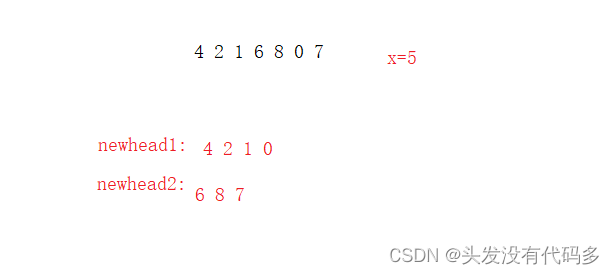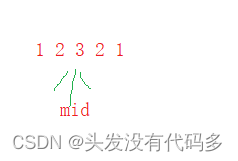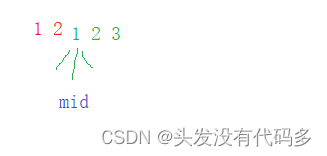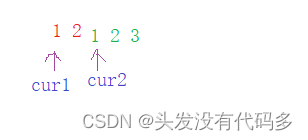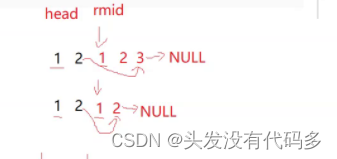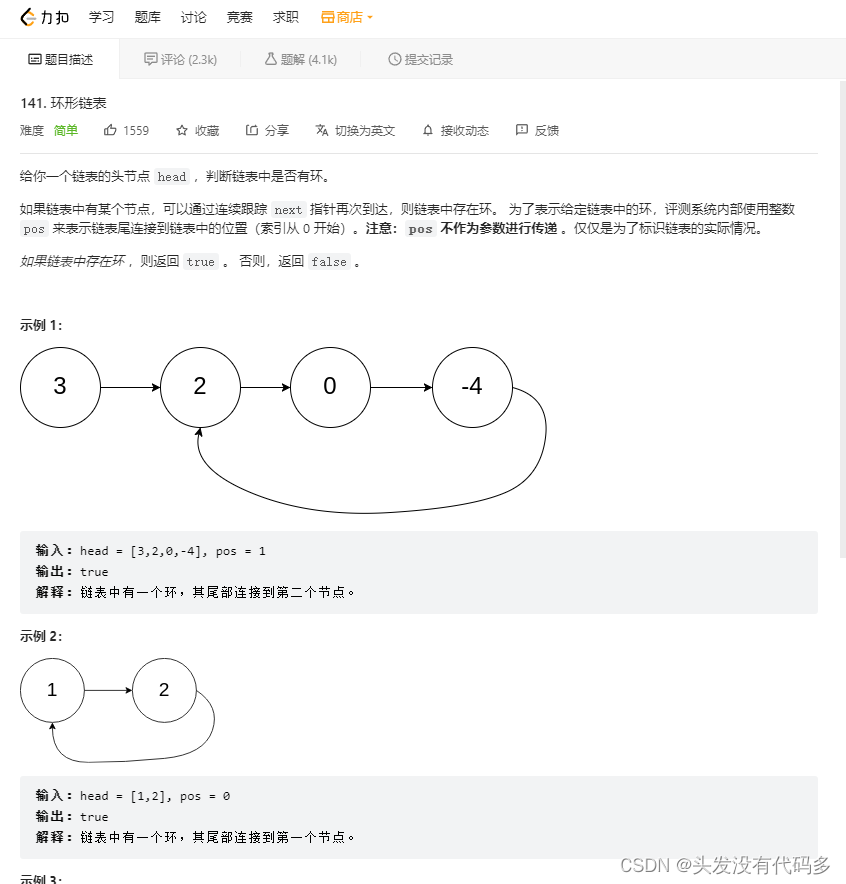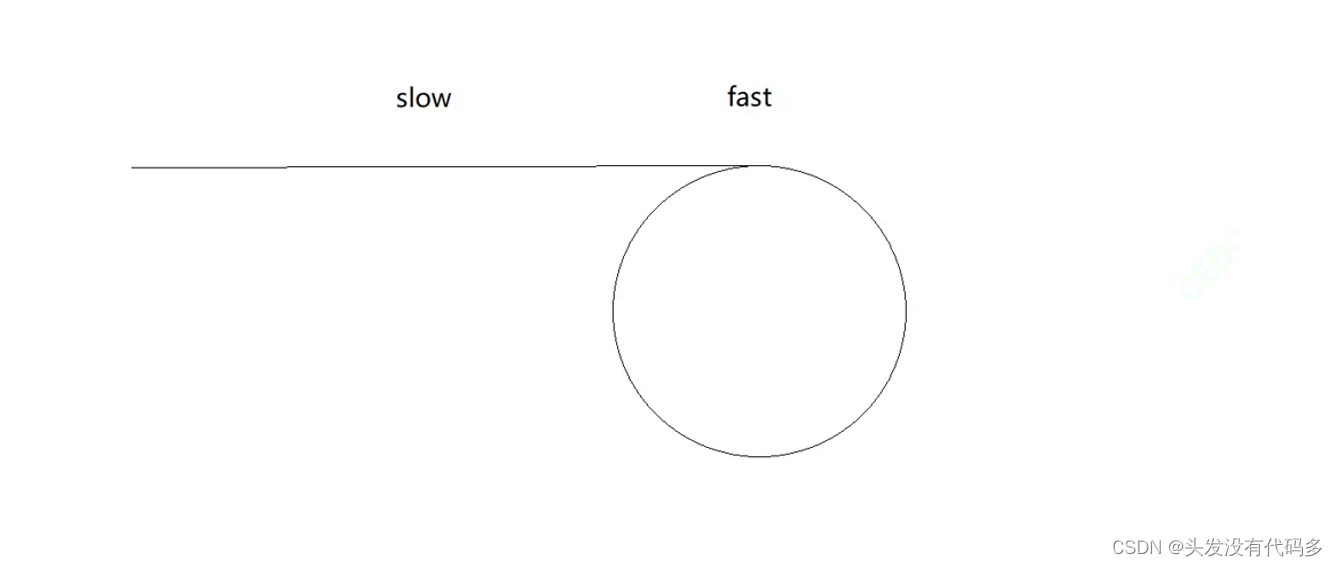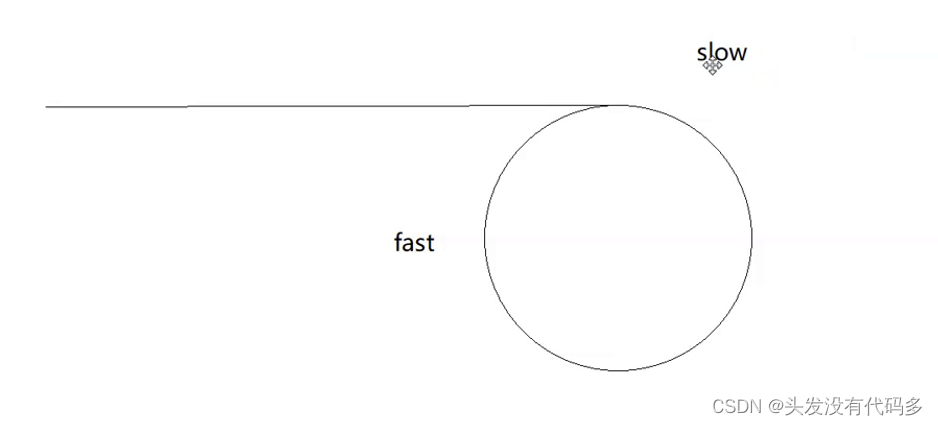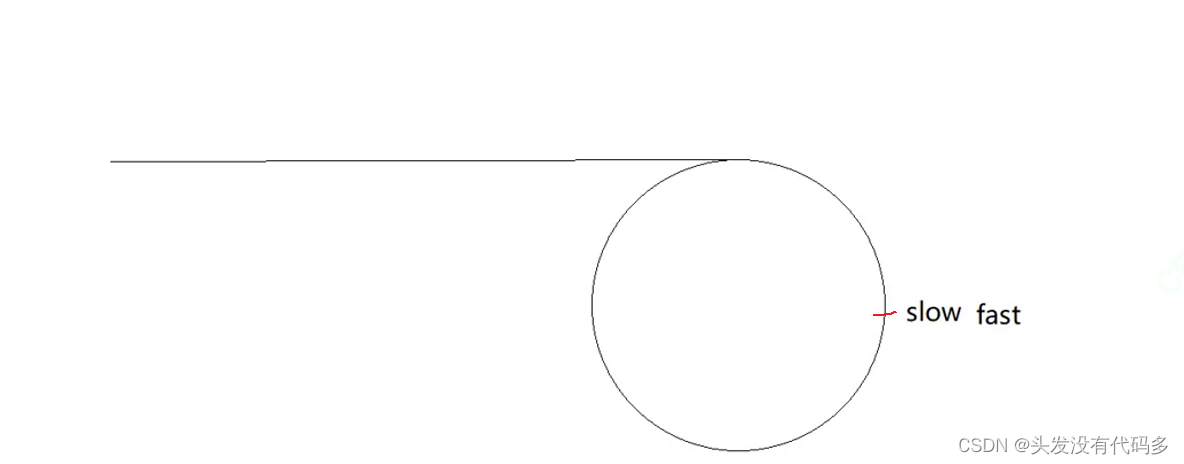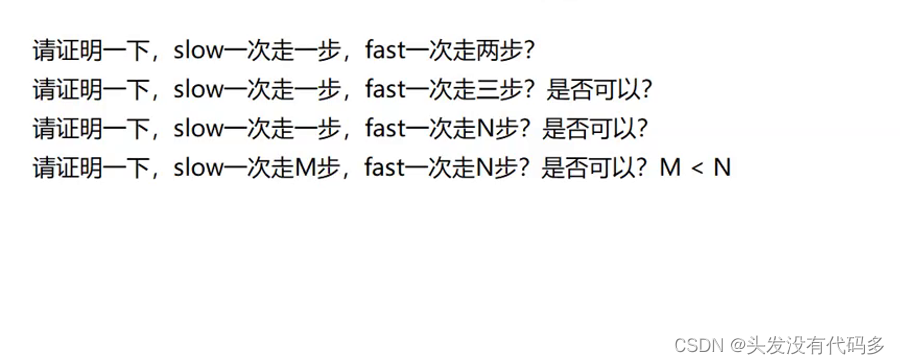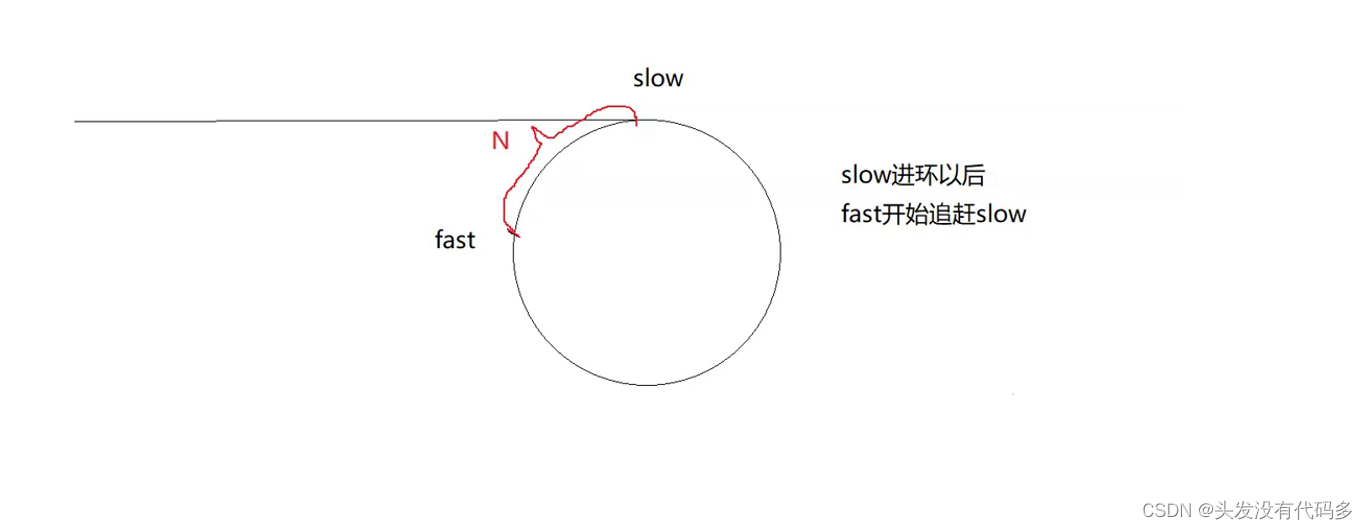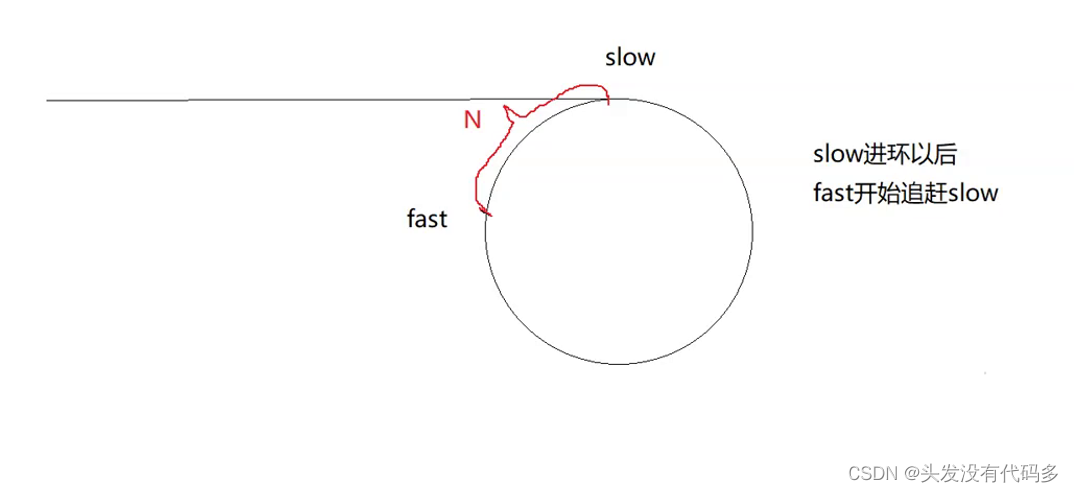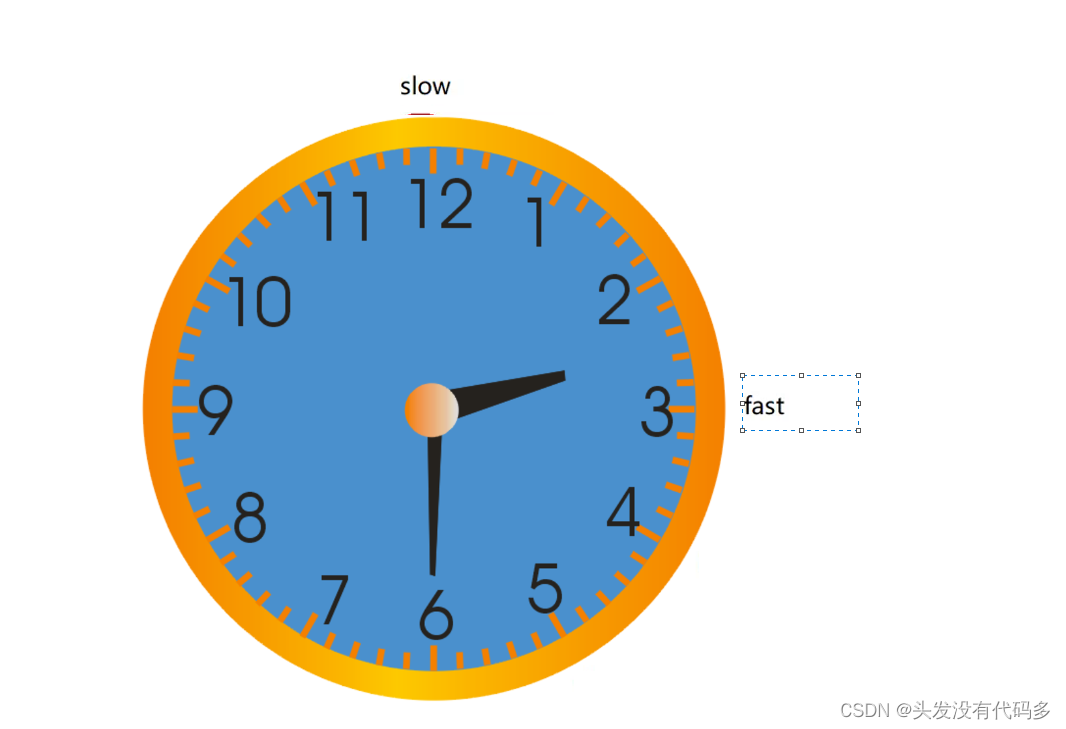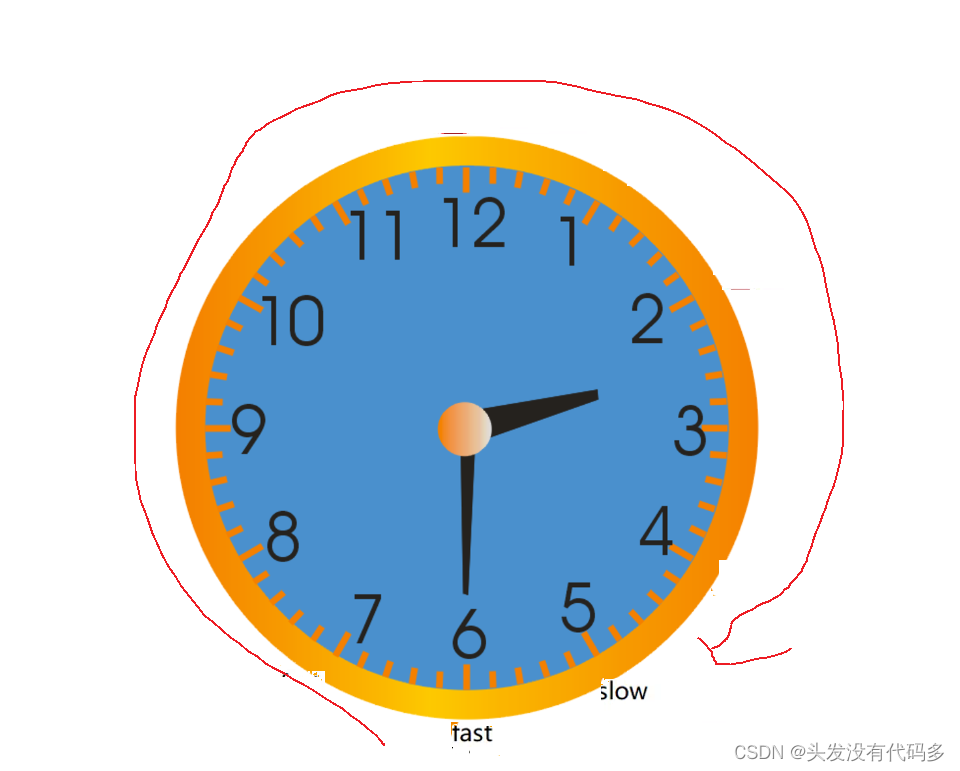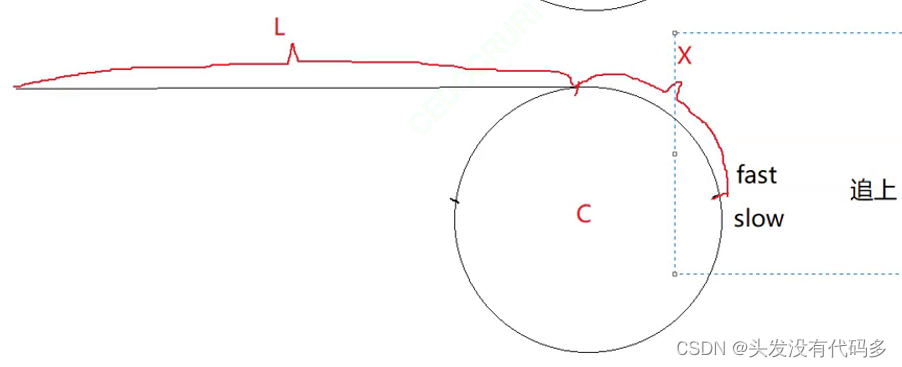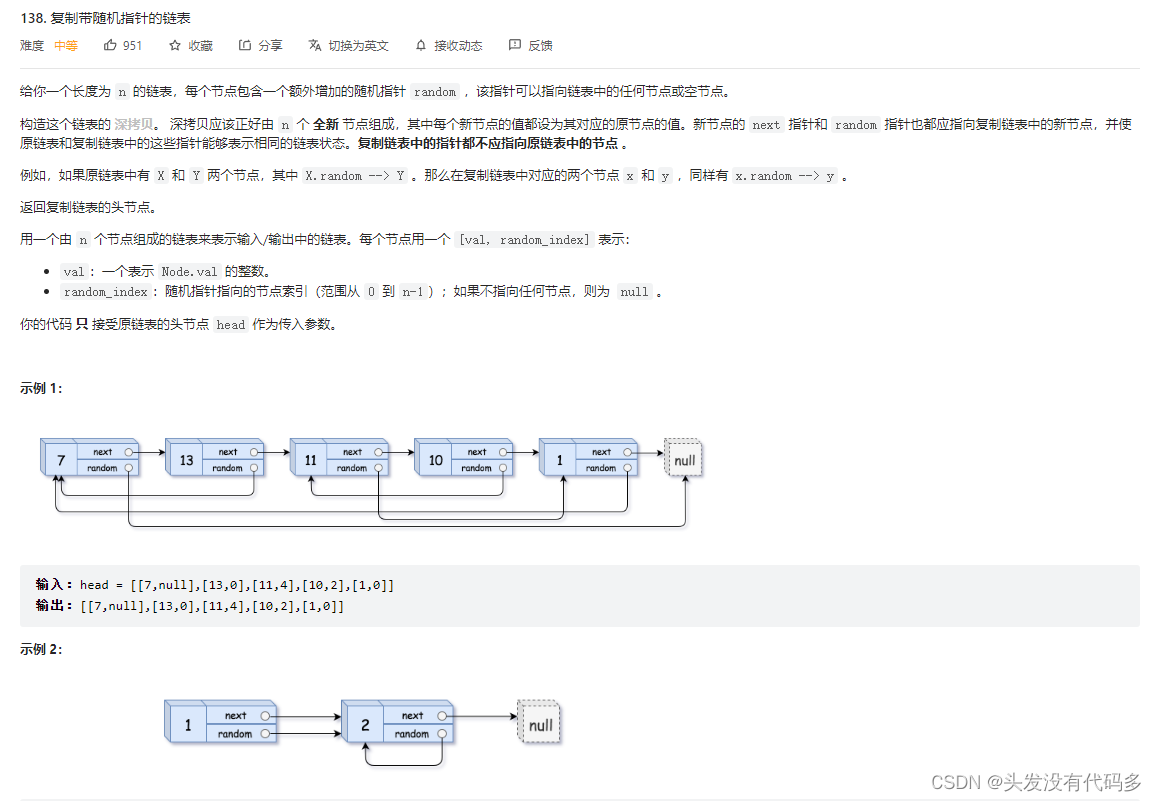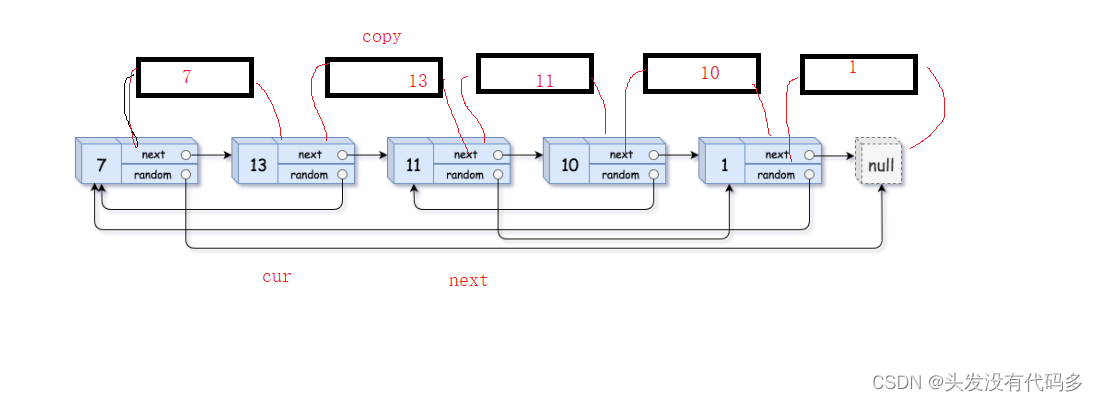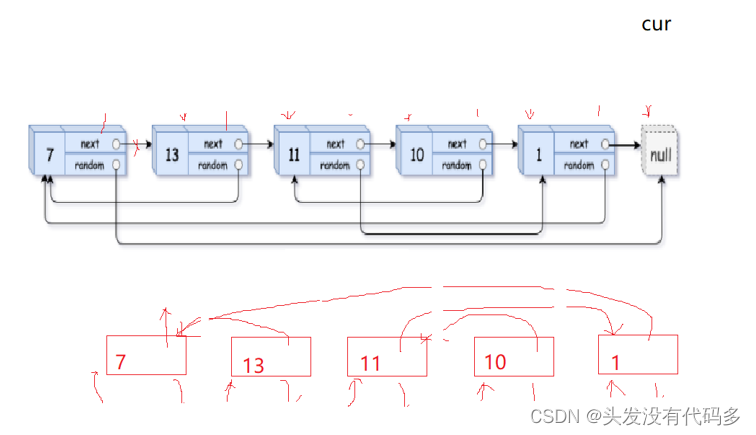目录
练习题1 链表分割
练习题2 链表的回文结构
练习题3 链表相交
练习题4 判断是否为环形链表
快慢指针延伸问题
练习题5 找环形链表的节点
练习题6 复制带随机指针的链表
练习题1 链表分割
点击跳转
思路:
将链表一分为2,以x为界限,大于x的尾插到新链表1,小于x的尾插到新链表2
,之后再将新链表1,头插到新链表2,跟归并排序有点像
class Partition { public: ListNode* partition(ListNode* pHead, int x) { ListNode*Guard1=(ListNode*)malloc(sizeof(ListNode)); ListNode*Guard2=(ListNode*)malloc(sizeof(ListNode)); ListNode*tail1=Guard1; ListNode*tail2=Guard2; while(pHead) { if(pHead->valnext=pHead; tail1=tail1->next; } else { tail2->next=pHead; tail2=tail2->next; } pHead=pHead->next; } tail1->next=Guard2->next; tail2->next=NULL; free(Guard2); return Guard1->next; } };
练习题2 链表的回文结构
思路:
1.先找到中间节点
2.从中间节点一直到末尾节点内的节点进行逆置
3. 用俩个节点分别指向头和中间位置,然后挨个进行数字比较,若不想等,直接退出
注:当奇数时候,第一个2,仍然指向3,因此判断相等
struct ListNode* middleNode(struct ListNode* head){ struct ListNode*fast,*slow; fast=slow=head; while(fast&&fast->next) { fast=fast->next->next; slow=slow->next; } return slow; } struct ListNode* reverseList(struct ListNode* head){ struct ListNode*cur=head; struct ListNode*prve=NULL; while(cur) { struct ListNode*t=cur->next; cur->next=prve; prve=cur; cur=t; } return prve; } class PalindromeList { public: bool chkPalindrome(ListNode* A) { ListNode*mid=middleNode(A); struct ListNode*rmid=reverseList(mid); while(A&&rmid) { if(A->val!=rmid->val) return false; else { rmid=rmid->next; A=A->next; } } return true; } };方法二:临时拷贝一份,然后一个一个比较
练习题3 链表相交
160. 相交链表 - 力扣(LeetCode)
相交链表特点:最后一个节点的地址相等
方法:1.求俩个出链表的长度,即让俩个链表都走到尾节点
2.求出他们的距离差d
3.较长的链表先走d步,然后俩个链表开始一起走,每次走一步
struct ListNode *getIntersectionNode(struct ListNode *headA, struct ListNode *headB) { struct ListNode *newhead1=headA; struct ListNode *newhead2=headB; int k=1;int z=1;int c=0; while(newhead1->next) { newhead1=newhead1->next; k++; } while(newhead2->next) { newhead2=newhead2->next; z++; } if(newhead1!=newhead2) return NULL; c=abs(k-z); while(c--) { if(k>z) headA=headA->next; else headB=headB->next; } while(headA&&headB) { if(headA==headB) return headA; else { headA=headA->next; headB=headB->next; } } return NULL; }struct ListNode *getIntersectionNode(struct ListNode *headA, struct ListNode *headB) { struct ListNode *newhead1=headA; struct ListNode *newhead2=headB; int k=1;int z=1; while(newhead1->next) { newhead1=newhead1->next; k++; } while(newhead2->next) { newhead2=newhead2->next; z++; } if(newhead1!=newhead2) return NULL; int gap=abs(k-z); struct ListNode *Longlist=headA; struct ListNode *ShoreList=headB; if(knext; } while(Longlist!=ShoreList) { Longlist=Longlist->next; ShoreList=ShoreList->next; } return Longlist; }
练习题4 判断是否为环形链表
141. 环形链表 - 力扣(LeetCode)
带环链表:1.不能遍历,会陷入死循环
利用快慢指针,快指针一次走俩步,慢指针走一步
当slow走到中间位置时,fast进入环内
当慢指针进环时,快指针在环内已经走了一小会了,具体走到了哪里,无法知晓 (要根据环的大小决定),但是可以知道fast在环里走的路程,是slow从中间到进环路程的2倍
slow进入环后,看作是fast追赶slow
假设在红色位置fast追上了slow
bool hasCycle(struct ListNode *head) { struct ListNode *fast=head; struct ListNode *slow=head; while(fast&&fast->next) { fast=fast->next->next; slow=slow->next; if(slow==fast) return true; } return false; }
快慢指针延伸问题
证明:slow走一步,fast走俩步,fast能追上slow
假设:slow进环以后,fast和slow之间的差距是N,即追赶距离为N
slow和fast每移动一次,他们的距离会缩小一格
因此距离由:N,N-1,N-2,N-3……0
所以,能追上
证明:slow走一步,fast走三部,能否追得上
假设:slow进环以后,fast和slow之间的差距是N,即追赶距离为N
一开始fast在3,slow进入圆环
slow和fast每移动一次,他们的距离会缩小2格,他们的距离N=9
此时距离是-1,-1意味着,他们之间的距离变成了C-1(C是环的长度)
最终距离是0还是其他数字,由N决定
如果N是奇数,N=9
9,7,5,3,1,-1
-1意味着,他们之间的距离变成了C-1(C是环的长度)
如果C-1是偶数,即他们的距离是偶数每次-2,一定追得上,如果C-1是奇数,又得去判断下一次C-1是偶数还是奇数
因此,能否追的上如果距离是偶数,则追得上
如果距离是奇数,得看C-1是否为偶
练习题5 找环形链表的节点
142. 环形链表 II - 力扣(LeetCode)
方式1.公式证明
用快慢指针:fast走的距离=2*slow的距离
公式推导
假设进环前的长度L,假设环的长度C,入口点到相遇点距离x
slow所走距离:L+X,慢指针所走的距离不可能超过一圈,因为N最大是C-1
fast所走距离:L+NC+X,N代表fast走过的圈数,N>=1
2(L+X)=L+X+NC
(L+X)=NC
L=NC-X
L=(N-1)*C+C-X
左边是A所走距离,右边是B所走距离
可证明:一个指针A从头开始走,另一个指针B从相遇点开始走,最终会在入口点相遇
struct ListNode* detectCycle(struct ListNode* head) { struct ListNode* slow = head; struct ListNode* fast = head; struct ListNode* meetnextl =NULL; while (fast && fast->next) { slow = slow->next; fast = fast->next->next; if (fast == slow) { meetnextl = fast; while(head!=meetnextl) { meetnextl=meetnextl->next; head=head->next; } return head; } } return NULL; }方法2:转换成相交问题
fast旁白的黑色是相遇点,下面蓝色是相遇点的下一个点,A和B链表的交点,就是入口点 ,
然后让长的先走,接着同时走,跟上面的题一样
struct ListNode *getIntersectionNode(struct ListNode *headA, struct ListNode *headB) { struct ListNode *newhead1=headA; struct ListNode *newhead2=headB; int k=1;int z=1; while(newhead1->next) { newhead1=newhead1->next; k++; } while(newhead2->next) { newhead2=newhead2->next; z++; } if(newhead1!=newhead2) return NULL; int gap=abs(k-z); struct ListNode *Longlist=headA; struct ListNode *ShoreList=headB; if(knext; } while(Longlist!=ShoreList) { Longlist=Longlist->next; ShoreList=ShoreList->next; } return Longlist; } struct ListNode *hasCycle(struct ListNode *head) { struct ListNode *fast=head; struct ListNode *slow=head; while(fast&&fast->next) { fast=fast->next->next; slow=slow->next; if(slow==fast) return slow; } return fast; } struct ListNode* detectCycle(struct ListNode* head) { struct ListNode* guard1 = hasCycle(head); if(guard1==NULL) return NULL; struct ListNode*fast=head; struct ListNode*slow=head; struct ListNode* meetnextl =NULL; while (fast && fast->next) { slow = slow->next; fast = fast->next->next; if (fast == slow) { meetnextl = fast->next; fast->next=NULL; struct ListNode* guard2 = getIntersectionNode(head, meetnextl); return guard2; } } return NULL; }
练习题6 复制带随机指针的链表
138. 复制带随机指针的链表 - 力扣(LeetCode)
思路:
1.先拷贝各个节点,插到相对应的节点后面,然后将链表连接起来
2.然后将cur的random所指指针赋值给copy的random
if(cur->random!=NULL)
copy->random=cur->random->next
3.将各节点拷贝下来进行链接,顺便链接原链表
* struct Node { * int val; * struct Node *next; * struct Node *random; * }; */ struct Node* copyRandomList(struct Node* head) { struct Node*cur=head; struct Node* next=NULL; struct Node*copy=NULL; while(cur) { //1.拷贝一份插入链表内 copy=(struct Node*)malloc(sizeof( struct Node)); next=cur->next; copy->val=cur->val; cur->next=copy; copy->next=next; cur=next; } cur=head; while(cur) { //2.链接random copy=cur->next; if(cur->random==NULL) copy->random=NULL; else copy->random=cur->random->next; cur=cur->next->next; } cur=head; struct Node*newhead=NULL; struct Node*tail=NULL; while(cur) { copy=cur->next; next=copy->next; if(newhead==NULL) newhead=tail=copy; else { tail->next=copy; tail=tail->next; } cur->next=next; cur=next; } return newhead; }

